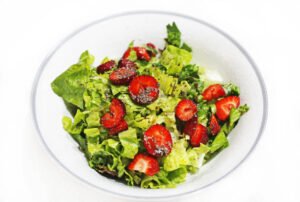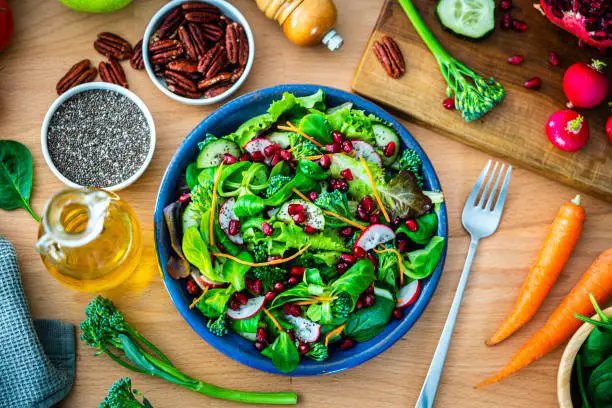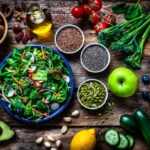A new player is leading culinary innovation as kitchens grow more health-conscious and ingredient-focused. Chia oil, made from Salvia Hispanica seeds, is a nutritional and culinary powerhouse. Chia oil is becoming a norm in cooking because of its high omega-3 unsaturated fat focus, gentle flavor, and flexibility.
Alpha-linolenic corrosive (ALA) is chia oil’s fundamental draw. The body can’t produce omega-3 unsaturated fats; in this manner, they should be eaten. These fats are quieting and profitable to the heart, brain, and cells. Chia oil can assist with peopling who don’t eat fish or need more plant-based omega-3s. Its high omega-3 focus helps wellbeing and allows dinners to be healthfully improved without evolving flavor.
Chia oil’s mild flavor makes it ideal for salad dressing, pouring over foods, and baking. Its subtlety preserves the flavors of its ingredients. Chefs and home chefs use chia oil to enhance cuisine without overpowering other flavors. This makes it ideal for delicately flavored items like shellfish, fresh vegetables, and smoothies.
Another benefit of chia oil is its higher smoke point than flaxseed or olive oil. Due to this feature, chia oil is safer for high-temperature cooking. Heat breaks down low-smoke-point oils, releasing damaging free radicals. However, chia oil stays stable when sautéing or roasting, preserving its nutritious benefits and flavor.
Chia oil has cancer prevention agent properties as well as cooking. It contains cancer prevention agents, for example, chlorogenic corrosive, caffeic corrosive, and flavonols that battle oxidative pressure. Incorporating antioxidant-rich foods like chia oil can help maintain long-term health because oxidative stress causes aging and many chronic diseases.
Chia oil is used in food preservation because of its antioxidant characteristics. It can be utilized in natural preservatives to enhance perishable product shelf life without chemicals. Its preventive properties preserve food freshness and nutritional value.

Chia oil is appropriate for people with dietary limits. It is without gluten, sans dairy, and safe for nut-responsive qualities, making it an adaptable component for different weight control plans. This expansive materialness is particularly valuable in the expanded culinary scene, where diets impact dinner arranging and planning.
Chia oil additionally allures for its maintainability. Chia plants are profoundly versatile and require little water, making them a practical yield. Along these lines, chia oil fabricating advances reasonable, biologically well-disposed horticulture. Food clients who care about the climate are progressively worried about this.
Chia oil can make ordinary things taste great in gourmet and everyday cooking. It also promotes a healthy lifestyle and sustainable agriculture outside the kitchen. Chia oil’s popularity indicates that food consumption is shifting toward health, flavor, and sustainability.
Adding chia oil to your pantry adds a multifunctional product that supports health, improves cooking, and is environmentally friendly. It adds a subtle yet robust flavor to any dish, illustrating that tiny seeds may have big advantages. Embracing ingredients like chia oil will shape the future of cooking and eating, demonstrating that good health and flavor coexist.
The Essential Role of Chia Oil in Modern Cooking
Due to its high nutritional value and versatility, chia oil, made from chia seeds, is becoming a kitchen staple globally. This relatively new culinary additive improves heart health and dish flavor. Unique qualities make chia oil a promising alternative to typical cooking oils as more people seek healthier options.
One of chia oil’s biggest benefits is its high omega-3 fatty acid concentration. Unlike most plant oils, Chia oil has a lot of alpha-linolenic acid (ALA), an omega-3 present in plants. This nutrient is critical for heart health, inflammation reduction, and brain function. Regular omega-3 fatty acid consumption lowers the risk of heart disease, arthritis, and several malignancies. Due to its plant-based omega-3, chia oil suits vegetarians and vegans who cannot eat fish oil.
Chia oil adds a mild, nutty flavor to meals and is healthy. This makes it ideal for salads, marinades, and finishing oils that add elegance without changing the flavor profile. Chia oil’s subtle flavor complements salads and vegetables better than other oils, adding rich texture and flavor.
Chia oil’s high smoke point makes it safer and more effective for high-temperature cooking. Unlike other oils that break down and release toxic chemicals when fried or sautéed, chia oil retains its nutritious value when fried or sautéed. Due to its stability, the oil retains its health advantages and improves food taste by not going rancid when overheating.

Chia oil is abundant in antioxidants like quercetin, myricetin, and kaempferol. These antioxidants protect cells from free radicals and unstable chemicals that can cause disease and hasten aging. Due to its antioxidant properties, chia oil is a cooking ingredient and health supplement.
Chia oil is versatile beyond cooking. Since its antioxidant capabilities extend food shelf life, it is increasingly used in food preservation. Chia oil can prevent fruit and vegetable rotting and preserve nutritional value. Healthy food products like energy bars and nutrient-dense beverages benefit from their high nutrient content.
Chia oil also impacts dietary constraints and preferences in modern cooking. It is a non-allergenic alternative to typical oils, which may cause cross-contamination or allergic responses, as gluten-free, dairy-free, and other allergy-conscious diets become increasingly popular. This property of chia oil is crucial for professional kitchens and food makers who must meet many dietary criteria.
Sustainability in food sourcing is crucial, and chia oil excels here. Chia is more accessible to raise and has a lower environmental impact than other oilseed crops. It needs little water and thrives in many climes, making it a sustainable choice for eco-conscious consumers.
As chia oil gains popularity, its significance in gourmet and health-focused cuisine becomes clearer. Its nutritional value and culinary variety make it essential in modern kitchens. Chia oil boosts nutritional content and promotes a healthier, more sustainable lifestyle in home and professional cooking. Chia oil is used in daily cooking due to a greater awareness of food and health.
In conclusion, chia oil is a versatile, healthy, and sustainable kitchen addition. By adding chia oil to your cooking, you add nutrients and promote a better, more sustainable lifestyle. As culinary trends shift toward healthier, more ecologically friendly options, chia oil shows how modern kitchens may adapt without sacrificing flavor or quality. Chia oil is a must-have product for chefs and home cooks alike that will improve your cooking and health.






Leave a Reply